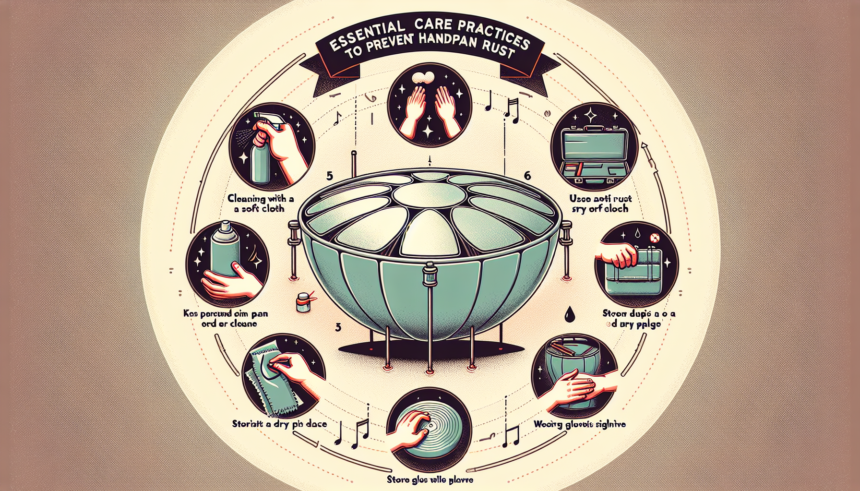Introduction
The handpan is a beautiful, resonant instrument that requires proper care to maintain its quality and longevity. One of the chief concerns for handpan enthusiasts is preventing rust, which can affect both the appearance and sound of the instrument. This article will delve into essential care practices to prevent handpan rust, ensuring that your instrument remains in excellent condition.
Understanding Handpan Material
Most handpans are made from nitrided steel, a type of steel that has undergone a nitrogen treatment to increase its resistance to corrosion. Despite this treatment, handpans are still susceptible to rust if not properly cared for. Understanding the material of your handpan is the first step in preventing rust.
Daily Care Practices
1. Cleaning After Each Use
After playing your handpan, it is important to clean it to remove any oils, sweat, or dirt left from your hands. Use a soft microfiber cloth to gently wipe the surface, ensuring you reach every nook and cranny. This simple practice can significantly reduce the risk of rust.
2. Using a Protective Oil
Applying a protective oil, such as Phoenix Oil or Froglube, can create a barrier against moisture, one of the primary causes of rust. After cleaning your handpan, apply a small amount of oil onto a cloth and gently rub it onto the surface of the instrument.
- Phoenix Oil: Specifically designed for handpans, this oil provides excellent protection while being safe for the instrument.
- Froglube: Originally developed for firearms, this oil is non-toxic and offers good protection against rust.
3. Keep it Dry
Moisture is the enemy of all metal instruments. Always ensure your handpan is dry before storing it. If you play in a humid environment, consider using silica gel packs in your handpan case to absorb any excess moisture.
4. Proper Storage
Store your handpan in a cool, dry place. Avoid places with high humidity or significant temperature changes, such as basements or attics. A well-ventilated room with a stable climate is ideal.
Long-Term Care Practices
1. Regular Full Cleanings
In addition to daily maintenance, give your handpan a thorough cleaning every few months. This process should involve removing any accumulated oil and dirt, followed by reapplying a protective coating.
2. Inspection for Early Signs of Rust
Regularly inspect your handpan for any signs of rust. Early detection can make a significant difference in maintaining the instrument’s integrity. If you notice any rust spots, remove them immediately using a rust remover suitable for nitrided steel.
3. Avoiding Harsh Chemicals
Never use harsh chemicals or abrasive materials on your handpan. These can damage the surface and remove the protective nitrided layer, making your handpan more susceptible to rust.
4. Professional Maintenance
Consider taking your handpan to a professional for maintenance every year or so. They can perform a more comprehensive cleaning, check for potential issues, and offer advice on care specific to your handpan model.
Environmental Considerations
1. Playing Outdoors
While playing your handpan outdoors can be a beautiful experience, it also exposes the instrument to elements that can accelerate rusting. If you take your handpan outside, avoid placing it on the ground directly, and be mindful of weather conditions. Always clean and dry the instrument thoroughly after outdoor use.
2. Humidity Control
If you live in a particularly humid area, using a dehumidifier in the room where your handpan is stored can be beneficial. This practice helps to control the overall moisture level in the air, reducing the risk of rust.
3. Temperature Stability
Extreme temperature fluctuations can affect the metal of your handpan. Avoid storing your instrument in places where temperatures swing drastically, such as near windows or in vehicles. Stable, room-temperature conditions are best.
Conclusion
Taking care of your handpan involves a combination of daily maintenance, regular inspections, and mindful storage. By understanding the material and adhering to these essential care practices, you can prevent rust and ensure that your handpan remains in pristine condition for years to come. Remember, a well-maintained handpan not only looks good but also produces the best possible sound, allowing you to enjoy its unique, melodic tones fully.
FAQs
1. What is the best oil for preventing handpan rust?
The best oils for preventing handpan rust are Phoenix Oil and Froglube. Both are specifically formulated to offer excellent protection while being safe for the instrument.
2. How often should I clean my handpan?
You should clean your handpan after every use to remove any oils and dirt from your hands. Additionally, a thorough cleaning every few months is recommended to maintain its condition.
3. Can I use regular household cleaners on my handpan?
No, you should avoid using household cleaners as they often contain harsh chemicals that can damage the handpan’s surface. Stick to products designed specifically for metal instruments.
4. What should I do if I see rust on my handpan?
If you notice rust spots, remove them immediately using a rust remover suitable for nitrided steel. Follow up by cleaning and oiling the affected area to prevent further rusting.
5. Is it safe to play my handpan outdoors?
Yes, but with caution. Outdoor conditions can expose your handpan to elements that accelerate rusting. Ensure you do not place it directly on the ground, and clean and dry it thoroughly afterward.





